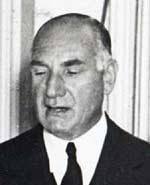

| Barney Balaban | Louis B. Mayer |
| James F. Byrnes | Dore Schary |
| Harry Cohn | "General" Nicholas Schenck |
| William Goetz | Mendel Silberberg |
| Samuel Goldwyn | Spyros Skouras |
| Eric Johnston | "Major" Albert Warner |

Albert (Anglicized from Abe) Warner had ambled through several occupations before entering the film business. He and older brother Harry had run a bicycle shop in Youngstown, Ohio, during the bicycle craze of the 1890s, then set out on the road to sell soap for Swift and Company. In 1903 Sam, the eldest of the four Warner brothers, decided to reunite the whole family in Youngstown and set up a nickelodeon in the back of father Ben's shoe repair store. Movies were catching on (Albert handled the box office receipts) here as elsewhere in America, and the Warner brothers quickly opened film exchanges to control two of the three phases of the burgeoning business until they were squeezed out of distribution by Thomas Edison's Motion Picture Patents Trust in 1909. They retrenched in the theater end and bolstered their cash flow by importing and showing films city by city. This success encouraged them to re-enter the distribution business in 1914, by which time Edison's Patents Trust was being broken apart in the courts. Soon they had bought the Skouras brothers' theater holdings in St. Louis, Missouri (at Albert's suggestion) and by 1918 they had moved to Hollywood. Their production output was limited to two or three films a year in a crowded and chaotic marketplace.
In the early 1920s Harry Warner was company president, Albert was the treasurer and Jack and Sam shared production duties. Albert and Harry were headquartered in New York. When Sam died in 1927 on the night before "The Jazz Singer" premiere, Jack took over the production reins and Albert took over the ever-growing Warner Bros. distribution arm. Jack sold his share in 1967, the year Albert died.
As the two older Warner siblings, Harry and Albert's chief position in the company was to keep Sam and Jack from killing each other. This might explain why, with Sam dead and Jack doing a solo in the spotlight, Harry and Albert sold out their company interests in 1956 (but were back-stabbed by Jack). Despite their fraternal struggles, however, "The Warner Brothers always considered themselves as one," according to Harry.
Albert Warner was called "Major" as a remnant of a military career. As with any quartet where one member is flamboyant, one is brooding, one is reluctant and one is sensible, Albert seems to have been the "sensible" Warner brother. He was dignified and more high-minded than his freres and may well have become reactionary when the dual specters of financial ruin and public opinion were hoisted in the Waldorf conference.